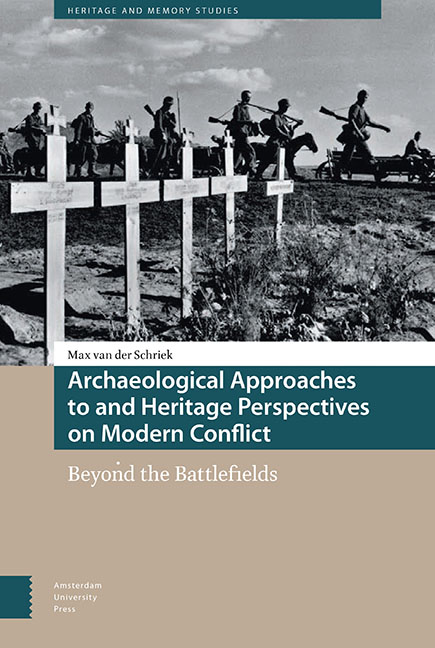Book contents
- Frontmatter
- Dedication
- Contents
- List of figures
- Acknowledgements
- 1 Introduction
- 2 Conflict archaeology
- 3 Landscape biographies of commemoration
- 4 Status quaestionis of conflict archaeology
- 5 Scientific and societal importance
- 6 The application of LiDAR-based DEMs
- 7 Summary and final debate
- Synopsis
- Appendix: WWII-related archaeological researches in the Netherlands (1984-2017)
- Bibliography
- Index
5 - Scientific and societal importance
Published online by Cambridge University Press: 27 April 2022
- Frontmatter
- Dedication
- Contents
- List of figures
- Acknowledgements
- 1 Introduction
- 2 Conflict archaeology
- 3 Landscape biographies of commemoration
- 4 Status quaestionis of conflict archaeology
- 5 Scientific and societal importance
- 6 The application of LiDAR-based DEMs
- 7 Summary and final debate
- Synopsis
- Appendix: WWII-related archaeological researches in the Netherlands (1984-2017)
- Bibliography
- Index
Summary
Abstract
This chapter delves into the legal problems and questions facing Dutch conflict archaeologists. When valuing archaeological monuments, meaning is implicitly given to those features and artefacts. The central focus of this chapter is the valuation of sites of conflict. Most modern conflicts belong to living memory, and their investigation and presentation requires a sensitive touch. Conflict archaeologists are often confronted with political interventions, media pressure or unexpected reactions by local communities. From a policy perspective, current heritage legislation is problematic in that it does not provide legal protection for more recent archaeological heritage sites in most cases. Current archaeological excavation protocols are in conflict with legislation on weapons and ammunition, which limits the development of a methodology and excavation skills.
Keywords: archaeological valuation, archaeological selection, laws and legislation, metal detecting, archaeological protocols
Archaeological heritage management in the Netherlands
The first part of this chapter deals with the legal background of heritage management and conflict archaeology in the Netherlands, connecting research with policy, development and the public. When valuing archaeological monuments, meaning is implicitly given to those features and artefacts. Although the Dutch regulations are outlined here, the central focus of this chapter is the valuation of sites of modern conflict. How are these sites represented? How are they valued? Can they be used as a point of reference for other countries? Archaeological heritage management in the Netherlands is concerned with the identification, protection, management and preservation of features and artefacts of human activity, ranging from prehistory to modern times. As discussed, heritage is closely tied with the values and identities of contemporary society and local communities. Heritage is never an objective historical given, and both memories and constructed histories need to be understood within the context of the present. Heritage is to be regarded as a subjective perception of the past. People give meaning to places in the landscape (for example, a tree, a house or a monument), which anchor them to their living environment, and which were and are of key importance for the identity of a local community. Landscapes provide a vital link to the past and stimulate the consciousness of historical events.
- Type
- Chapter
- Information
- Archaeological Approaches to and Heritage Perspectives on Modern ConflictBeyond the Battlefields, pp. 173 - 216Publisher: Amsterdam University PressPrint publication year: 2022



